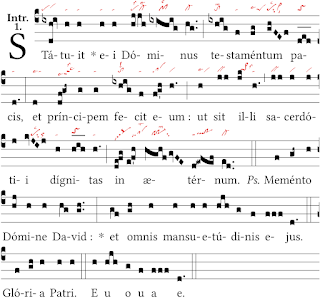Both of which one wants to keep: that of Saint Maurice and the Theban Legion, 'the 6,600', martyrs, and Saint Thomas of Villanova (1486-1555), one of the great reforming bishops of the 16th century. I settled on the second (each of the post-1570 calendars available to me-- 1910, 1939, 1954, 1955, and 1960 celebrate Saint Thomas with a commemoration of the Holy Martyrs) which is of double rank, meaning that at Matins there were three nocturns and nine lessons i.e. three from Tobias, three about the holy Bishop, three from Saint Gregory's 9th homily on the Gospel lesson from Saint Matthew. Quis ítaque iste homo est qui péregre proficíscitur, nisi Redémptor noster, qui, in ea carne quam assúmpserat, ábiit in cælum?
14 Sicut enim homo peregre proficiscens, vocavit servos suos, et tradidit illis bona sua. 15 Et uni dedit quinque talenta, alii autem duo, alii vero unum, unicuique secundum propriam virtutem: et profectus est statim. 16 Abiit autem qui quinque talenta acceperat, et operatus est in eis, et lucratus est alia quinque. 17 Similiter et qui duo acceperat, lucratus est alia duo. 18 Qui autem unum acceperat, abiens fodit in terram, et abscondit pecuniam domini sui. 19 Post multum vero temporis venit dominus servorum illorum, et posuit rationem cum eis. 20 Et accedens qui quinque talenta acceperat, obtulit alia quinque talenta, dicens: Domine, quinque talenta tradidisti mihi, ecce alia quinque superlucratus sum. 21 Ait illi dominus ejus: Euge serve bone, et fidelis: quia super pauca fuisti fidelis, super multa te constituam; intra in gaudium domini tui. 22 Accessit autem et qui duo talenta acceperat, et ait: Domine, duo talenta tradidisti mihi, ecce alia duo lucratus sum. 23 Ait illi dominus ejus: Euge serve bone, et fidelis: quia super pauca fuisti fidelis, super multa te constituam; intra in gaudium domini tui.
Saint Gregory asks, 'who is it, then, that man going out to travel abroad, but our Redeemer, taken up in His flesh to Heaven?'-- it is, this Gospel lesson of the talents and this homily of Gregory the Great, often read for the feasts of bishops (am supposing it is from the common of confessors).
This is the responsorium after the 2nd lesson from the Book of Tobit. Am making a mess of it writing this morning, ha, but it all coheres in a wonderful way, the Office does.
I'm going to presume that at Saint-Eugène later on Holy Mass will be of Saint Thomas, Statuit ei Dominus testamentum pacis, with commemoration of the Holy Martyrs of the Theban Legion.
As is indeed the case; Pater Thomas SJ is the celebrant on this partly cloudy Thursday.
Introitus. Eccli. 45, 30. Státuit ei Dóminus testaméntum pacis, et príncipem fecit eum: ut sit illi sacerdótii dígnitas in ætérnum. Ps. 131, 1. Meménto, Dómine, David: et omnis mansuetúdinis ejus. ℣. Glória Patri.
Offertorium. Ps. 88, 21-22. Invéni David servum meum, óleo sancto meo unxi eum: manus enim mea auxiliábitur ei, et bráchium meum confortábit eum.
Communio. Luc. 12, 42. Fidélis servus et prudens, quem constítuit dóminus super famíliam suam: ut det illis in témpore trítici mensúram.
Graduale. Eccli. 44, 16. Ecce sacérdos magnus, qui in diébus suis plácuit Deo. ℣. Ibid., 20. Non est invéntus símilis illi, qui conserváret legem Excélsi.
Allelúja, allelúja. ℣. Ps. 109, 4. Tu es sacérdos in aeternum, secundum órdinem Melchísedech. Allelúja.
The Old English Martyrology for today notes Saint Maurice and 'the Theban Legion'; it is the translation of Dr Christine Rauer, editor and translator of the text I have here, published by DS Brewer in 2016 p 187.
On the twenty-second day of the month is the passion of Saint Maurice and of 6,600 martyrs with him; that was an army of soldiers; they came from the eastern parts of Cappadocia to the aid of the emperor Maximian, and they were very successful men in all battles. But then eventually the emperor noticed that they were Christians; then he ordered them to be martyred, so that their sacred blood flowed across the ground like a stream. We do not know their names except for that of Saint Maurice, who was the army's leader, and Saint Exsuperius and Saint Candidus. The other names are written down in heaven in the books of life.
Have been tweeting bits and snippets from the Old English Martyrology each morning after noting the British and Anglophone saints from the Roman Martyrology and someone pointed out that perhaps I ought to be typing in an obvious placet of some sort from Dr Rauer or her publishers. I wrote to Dr Rauer (she's at Scotland's first university) and she most kindly responded.
Dear Marc, ah, the martyrologist would have been thrilled to know all his information gets disseminated like that. I am very happy for you to carry on tweeting these things, with or without specific acknowledgement. (As far as I’m concerned no reference to me needs to be given). It’s such a cool text, the OEM, if only more people were aware of it….
I know I go on about these latter days and the degradation of the popular culture and the nonsense that happens in universities et cetera but I'm always delighted to be reminded how much graciousness and civility and authentic academic life remains: αἰὲν ἀριστεύειν.
LDVM
Saint-Eugène-Sainte-Cécile, Saint Gregory the Great
[when there are too many characters for all the Labels to display properly, I'll add the extra ones here, ut supra]






Comments
Post a Comment